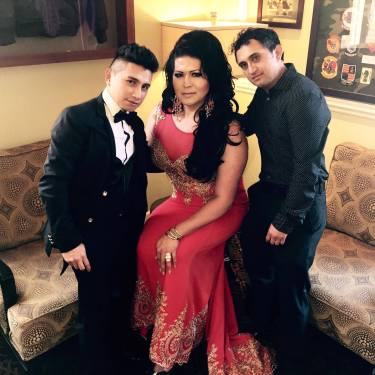Relocated #1: Call Me Sheila
Manage episode 166458201 series 1262014

Photo Courtesy of Sheila Magana
On a January morning in 2001, Sheila Magana walked out of her parent’s house in Michoacán, Mexico, with a suitcase in her hand. Magana, then 16, hadn’t ever lived away from her hometown. Through the back window of a city bus, she watched as her mother stood outside their home sobbing.
Magana hasn’t seen her mother since.
Born Agustín, Magana says that she always felt different as a child. By the time Magana turned eight years old, she knew that she was attracted to boys. After she became a teenager, Magana said that she still didn’t have the language to describe her feelings or identity.
“I didn’t know what being gay was, I didn’t know what transsexual was, I didn’t know what transgender was,” Magana said.
That all changed when Magana left Mexico. Her journey from the front door of her parent’s home in Michoacán led to a crossing over the U.S.-Mexico border with a smuggler and ultimately to a cousin’s house in Santa Rosa, California.
Several years after she left Mexico, Magana finally found the words to describe who she is today: a transsexual woman who was recently granted asylum in the United States.

Photo Courtesy of Sheila Magana
Magana, 32, is a six-foot-tall Mary Kay representative who lives in Oakland. She remembers that when she would play Papa and Mama as a kid with her friends back in Michoacán she always wanted to be the mother. Kids made fun of Magana because she walked differently and had a higher voice than other boys. Growing up in Mexico people called Magana rarito—a little strange.
“I started to play with my mom’s clothes, with the skirts, with the blouses,” Magana said. “When Selena died, I painted my lips red and danced to songs like Amor Prohibido. And I loved it.”
Her father didn’t like how Magana acted as a kid. Because she wasn’t a “normal” boy Magana’s father beat her, often waking her up in the middle of the night with blows.
Magana eventually ran away from her father and stayed with an uncle. But her new home offered little sense of refuge. In the middle of the night, Magana said that her uncle would wake her up and sexually abuse her.
“Instead of helping me, he just took advantage of my situation,” Magana said.
Life in Mexico can be extremely dangerous for LGBTQ people, who often become victims of gender-based violence and even hate crimes. The country has one of the world’s highest rates of transphobic violence. At least 194 transgender people have been killed in Mexico, according to a report published by the human rights organization Transgender Europe.
And yet moving to the United States didn’t immediately provide Magana with a sense of safety either. Family members in California disowned Magana after she started hormonal treatment to become a woman. A coworker hooked Magana on drugs and she soon wound up homeless and living in a dump near San Jose.
“I wanted to kill myself back then,” Magana said. “I hadn’t spoken with my mother in two years.”
Magana eventually went to rehab for a year in Oakland and has been sober for almost a decade. She settled in the East Bay and received asylum last year with the help of the East Bay Sanctuary Covenant (EBSC), a non-profit organization that was founded in 1982.
Located in downtown Berkeley, EBSC helps members of the immigrant community attain legal status in the United States. The organization launched the Affirmative Asylum program over two decades ago, filing 2,500 asylum cases that have had nearly a hundred percent success rate.
Magana is one of the many people that EBSC has helped to received asylum. She will receive U.S. residency in the next few months.
When she becomes a resident, Magana plans to return to Mexico to visit her mother and father. Her parents have accepted her for who she is and want to love her as a daughter.
From her new home in Oakland, Magana sends money home to her parents to support them in their old age.
“And when I wire them money, I sign my name as Sheila Magana,” she said.
Written and produced by Levi Bridges, Manjula Varghese and Marylee Williams
Special thanks to Sheila Magana, The East Bay Sanctuary Covenant, Mariela Patron and Joshua Johnson.
Music: Selena “Biddi Biddi Bom Bom”
10 episodes




